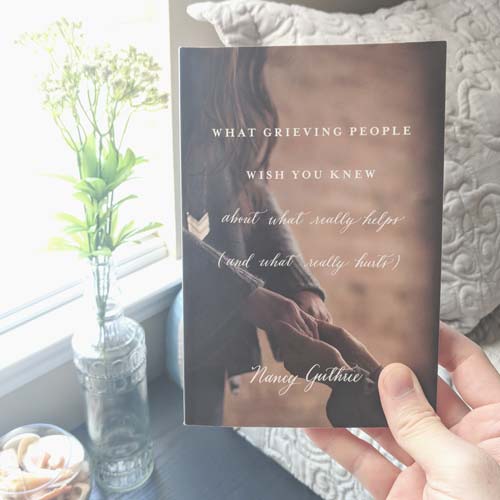So, do you want to know how to help a grieving friend or family member? While you may never know exactly the right thing to do, this book is the next best thing.
Here’s our book review of What Grieving People Wish You Knew by Nancy Guthrie.
Our website is supported by our users. We sometimes earn a commission when you click through the affiliate links on our website. See our privacy policy & disclosures for more information.
What Grieving People Wish You Knew: A Book Review
BOOK OVERVIEW
What Grieving People Wish You Knew about What Really Helps (and What Really Hurts) is the book’s full title. And it’s about exactly what the title says it’s about.
Writing from her own experiences of grief alongside years of teaching and hosting GriefShare seminars, author Nancy Guthrie illustrates each point with stories and comments sent in by readers and seminar attendees.
The result is a brief and highly readable book that will guide you through the very practical matters of:
- What to say (and what not to say)
- Typical things people say (and what you can say instead)
- Assumptions we make that keep us away (and why we should simply show up)
- What to do (and what not to do)
- Social media and grief (when the “like” button just seems wrong)
- Let’s talk about talking about heaven (and hell)
- A few quick questions (and answers)
These are the titles of each of the seven chapters, and they are just as helpful and practical as they sound.
Related: What should I write in a sympathy card? Tips & Tricks
READABILITY & USEFULNESS
What Grieving People Wish You Knew runs 180 pages in paperback, in a medium-sized font with plenty of spacing. A motivated reader could skim through the book in a couple of hours and get just about everything they need to know that they can just “be there” for a friend or family member and avoid the thoughtless things people often say.
If you were to take the time to read through every page, you’ll get a firm grasp on both specific things you can do and say to someone who is grieving as well as general ideas for ways to help or show love and friendship.
Urns Made in the USA
The book is not scholarly or theoretical. While the author does describe grief to some extent, she only does so to effectively communicate the main point of the book.
Everything is pretty succinct and on point: Here’s what you should (and should not) say and do, and here are the reasons why so that you can apply them in more situations.
Because so much of the book’s content is based on personal experiences and anecdotes from the author and many others, it is a breeze to read. The anecdotes are memorable and apt, effectively supporting each point so that you can readily remember and apply each tip later on.
BOOK CONTENT
So what do grieving people wish you knew?
Well, for starters, they wish you knew that you should say something. Anything. When someone they love dies, it is as if a huge hole in their life has been created. A massive shift in tectonics has taken place. When everyone in a region gets affected by a major event – an earthquake, 9/11, etc – you talk about it.
It is no different when the event is more personal. If a person loses a loved one, their whole world has just changed drastically. They need for you to acknowledge that this person’s existence and death matters.
When you avoid the grieving person’s gaze, or talk to them and avoid the subject of the death, it is as if you are saying that their loved one is not worthy of your attention. This is a pretty big deal!
So one of Guthrie’s main points is that you need to say something. Even if you blunder or babble, even if you have no idea what to say, you can at least say something. Of course the book gives plenty of examples of what you could say, even if it is something formulaic like “I’m so sorry for your loss,” or “Jim was such a great person, he will be missed.” The big point is that you should say something, and by doing so you are validating the mourner’s grief.
Specific tips include:
- Let the grieving person take the lead
- Don’t assume you know what they are going through or feeling
- Don’t compare their loss to yours or anyone else’s
- Don’t try to fix it
- Don’t rush it
- Don’t make it about you
- Listen more than you talk
- Esteem their grief
- Let the tears flow
All that is from just the first chapter! There is plenty more in the following chapters, like chapter 2 where Guthrie details some typical things people say, why they are not particularly helpful, and what you can say instead.
Many of the examples of what to say instead are real-life stories from people who remember an especially comforting phrase, card, gift, or act of service. This last part is detailed more in chapter 4, the section on What to Do (and What Not to Do).
Personally, I found those two chapters (2 and 4) the most informational and practical. There are plenty more great tips throughout the book, but you could gain a lot of insight just by reading chapters 1, 2, and 4.
Other content
Other sections cover the assumptions people make that keep them from trying to help with grief (chapter 3), how to engage with grieving people on social media (chapter 5), and a discussion of how to talk about heaven and hell (chapter 6). Each of these are important and necessary topics, but are what I would consider to be sub-topics of the main theme, which is so effectively addressed in the first, second, and fourth chapters.
A final chapter (7) provides answers to miscellaneous questions. This includes a wonderful section of Bible verses in answer to the question, “Should I share a Scripture verse with someone who is grieving?” The verses are ones suggestion by those who have experienced grief, and are some of the most beautiful and comforting passages in all the Bible.
Other questions include things like, “Should I get my friend to see a doctor about depression?” and “I’m the one who is grieving, how do I respond to all the insensitive things people say?”
Overall, What Grieving People Wish You Knew is a helpful resource, full of insight and practical advice that is eye-opening and sensitively written. With plenty of stories, examples, and anecdotes, it is a very easy read, and covers just about everything it needs to in just 180 brief pages.
PERSPECTIVE
Guthrie is a Christian and speaks from a Christian worldview. Her book assumes the existence of God, draws on the Bible as authoritative and true, and talks about Jesus, the gospel, and heaven and hell.
However, this is not a sappy book, and she in fact takes to task those who say highly unhelpful things like:
- He’s in a better place
- She’s watching from heaven
- I guess God just needed another angel in heaven
- It must have been God’s plan or God’s will
- “God works all things together for good”
- God doesn’t give you more than you can handle
Guthrie explains why each of these misguided phrases are wrong and actually hurtful, for Christian believers and unbelievers alike. Even better, she goes on to give direction on what you can say instead that might actually help.
CONCLUSION: OR, TL;DR
Grief is one of those things that can be understood by anyone and yet is uniquely experienced by each person. The beauty of Guthrie’s book is that it shows both sides of grief – from the inside looking out, and from the outside looking in.
What Grieving People Wish You Knew tells the stories of people who have lost a loved one and have either been hurt by thoughtless comments and advice or helped by simple gestures of grace and sympathy. Or, as many bereaved people have experienced, both.
By taking this approach, Guthrie is able to paint a picture of grief from the mourner’s perspective. While grief truly is different for each person, there are enough commonalities that those who are not sure what to do, how to act, or what to say can still confidently come alongside a friend or family member who has lost someone they love. What Grieving People Wish You Knew helps you do exactly that.
This is a brief work, highly readable and highly practical. There is just enough grief background/psychology/description to help you understand why each tip makes sense, but not too much that the book gets bogged down with theory.
Guthrie is a Christian and speaks from a Christian worldview. Her book assumes the existence of God, draws on the Bible as authoritative and true, and talks about Jesus, the gospel, and heaven and hell.
Filled with practical and actionable tips, ideas, and advice drawn from real-life stories from people who have experienced grief, What Grieving People Wish You Knew is a great resource for anyone who knows or will someday know someone who is grieving. In other words, it is a book everyone should read.
I give it 5/5 stars. You can get it here:
Read next: Funeral Etiquette: A Brief Guide on What to Do & Say
PIN IT







